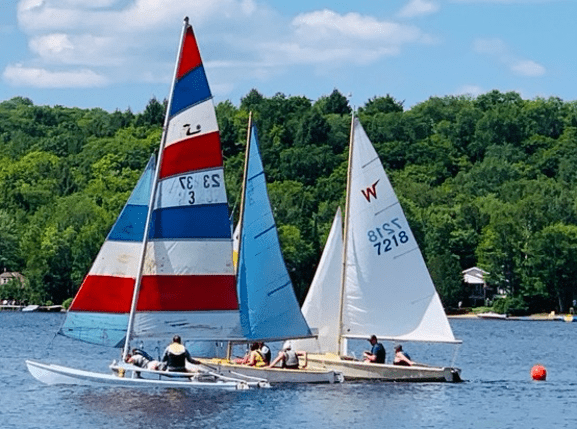An idyllic summer’s day on the lake?
How can we reduce our use of mechanized watercraft and still have heart-thumping fun?
By David Parsons.

The lakes of Muskoka begin the day in tranquility. Docks lined with chairs await their guests. Morning sips of coffee are enjoyed while breathing in the serenity of the lake. Early risers are out on paddleboards, kayaks, or canoes while loon calls echo across the water. Perhaps you may even hear the puttering of a tin boat of fisherfolk in the distance.
As the day progresses, many lakes become filled with assorted PWCs and powerboats churning up the surface and the water below. Towing skiers and tubers, or just going fast, these vessels are definitely fun. But the noise destroys the tranquility, wildlife retreat, and the shoreline bears the brunt of the motorized wakes.
So, what’s the alternative? After all, Muskoka is known for getting out on the water and enjoying all that nature has to offer. Canoeing, kayaking, and paddleboarding are wonderful emission-free means to get out on the lake. Pack a snack, a cold beverage — don’t forget the sunscreen — and head out for an idyllic adventure. Choosing a nonpowered craft allows you to take in the scenery and enjoy wildlife at an intimate level.
A leisurely paddle is enjoyable but rarely gets the adrenalin pumping. How can we reduce our use of mechanized watercraft and still have heart-thumping fun? How about sailing?
Sailing gives you quality time on the water, with nature providing the power. A sense of mastering the elements comes from steering with tiller and trimming sail to maximize boat efficiency as you glide across the lake. Wind conditions may challenge that sense of mastery, but windy days also provide those craved adrenalin rushes.
The sheer joy of sailing has to be experienced to be believed. On a leisurely low-wind day, you can embrace the panoramic views of the lake and overhead sky, a view which one might not see from shore or nearshore. Loons are oblivious to you as you sail by and if you’re lucky you’ll spot an eagle flying overhead. More blustery days will exercise both mind and body. Looking upward, taking in the view of mast and sails and the sky beyond, reminds you of what Muskoka days are meant to be.
Ril Lake, a relatively small Muskoka lake, is home to approximately sixteen sailing dinghies. The sailing season opens sometime in May and, depending on temperatures, concludes in late October. For me, the pinnacle of the sailing season is the Ril Lake Sailing Club sailing regatta which has been held annually since 2007. Albeit a friendly regatta, those sailing boats of the same type ooze some competitiveness and tongue-in-cheek trash-talk. On most summer days, our lake is busy with craft powered by fossil-fuel. But, come race afternoon the lake is virtually empty of powerboats and docks are lined with spectators cheering on the competitors and relishing a quiet lake dotted with colourful sails.
Has your appetite been whetted to enjoy the lake in a sailboat? Want to learn to sail? Connect with fellow sailors on your lake. Local sailing clubs have learn-to-sail programs as do various summer camps offering sailing instruction to their campers.
Ready to buy? Used boats are available and talking to your neighbours is a good way to begin. Online sites are another way to shop around. Purchasing used instead of new reduces your carbon footprint and is a good way into this sport. Whether we sail or paddle, the more we enjoy our lakes without using fossil fuel, the more we will benefit the watershed, the planet, and ourselves.

This is #11 in the current series of articles from Muskoka Watershed Council, edited by Peter Sale. Its author is David Parsons, a Director of MWC and also the member of the Ril Lake Association who oversees environmental testing of the lake. He has cottaged on Ril Lake for over 25 years. Over that time, he has restored 3 vintage sailing dinghies and takes advantage of any opportunity to go sailing. This article was published on MuskokaRegion.com on February 8, 2025.
